| Listing 1 - 7 of 7 |
Sort by
|
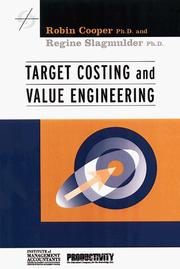
ISBN: 1563271729 9781351411769 1351411764 9780203737378 0203737377 9781351411752 1351411756 9781351411776 1351411772 9781563271724 Year: 1997 Publisher: Portland, Or. Productivity Press
Abstract | Keywords | Export | Availability | Bookmark
 Loading...
Loading...Choose an application
- Reference Manager
- EndNote
- RefWorks (Direct export to RefWorks)
Cost accounting --- Value analysis (Cost control) --- Target costing. --- 657.2 --- 657.47 --- cost accounting --- financieel management --- waardemanagement --- Analytische boekhouding --- Costing. Cost accounting --- Value analysis (Cost control). --- 657.47 Costing. Cost accounting --- Target costing --- Value engineering --- Cost control --- Cost effectiveness --- Industrial engineering --- Costing, Target
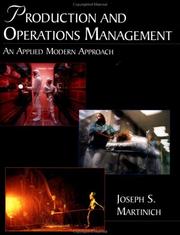
ISBN: 0471546321 Year: 1997 Publisher: New York (N.Y.): Wiley
Abstract | Keywords | Export | Availability | Bookmark
 Loading...
Loading...Choose an application
- Reference Manager
- EndNote
- RefWorks (Direct export to RefWorks)
In this new text, the author blends accessible coverage of quantitative methods with engaging qualitative topics. Meaningful examples clearly illustrate the logic and analytical thought process of modeling, and behavioral analysis is included in the use and implementation of analytical models. With a unique chapter of plant tours early in the book, students get a real-world, practical orientation throughout the text.* "On the Job" boxes- profiles of people in professions outside of operations who use operations management concepts daily- demonstrate the importance of Operations management to non-majors.* Quantitative and qualitative issues are fully integrated. Extended examples and real-world cases show students the range of analysis needed to manage, and how these tools are complementary rather than mutually exclusive.* Four different Plant Tours- including both manufacturing and service operations- show students real production systems in action.* "In Good Company" boxes demonstrate the importance of operations management in real companies.* The coverage is state-of-the-art throughout, including Lean Production. Just-in-time production, EDI, concurrent engineering and cellular production. Sections on ecological implications are included in several chapters.
Industrial engineering --- Production management --- Génie industriel --- Production --- Gestion --- 658.5 --- Management engineering --- Simplification in industry --- Engineering --- Value analysis (Cost control) --- Manufacturing management --- Industrial management --- Production engineering and planning. Design. Production management and control --- Industrial engineering. --- Production management. --- Productiebeheer --- Productiebeheer. --- 658.5 Production engineering and planning. Design. Production management and control --- Génie industriel
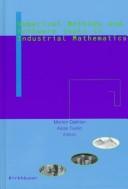
ISBN: 081763973X Year: 1997 Publisher: Boston, Mass. Birkhäuser
Abstract | Keywords | Export | Availability | Bookmark
 Loading...
Loading...Choose an application
- Reference Manager
- EndNote
- RefWorks (Direct export to RefWorks)
Engineering mathematics --- Industrial engineering --- 519.6 --- 519.6 Computational mathematics. Numerical analysis. Computer programming --- Computational mathematics. Numerical analysis. Computer programming --- Management engineering --- Simplification in industry --- Engineering --- Value analysis (Cost control) --- Engineering analysis --- Mathematical analysis --- Industrial applications --- Mathematics&delete& --- Computer programs --- Mathematics --- Programming
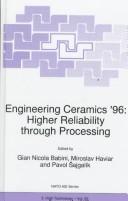
ISBN: 0792344588 9401064482 9401157987 Year: 1997 Volume: 25 Publisher: Dordrecht ; Boston : Kluwer,
Abstract | Keywords | Export | Availability | Bookmark
 Loading...
Loading...Choose an application
- Reference Manager
- EndNote
- RefWorks (Direct export to RefWorks)
Despite the significant progress, which has been made in developing of ceramic materials desired for engineering applications, their mass production is still not on expected level. Among the key factors hindering higher exploitation of these materials the problems in processing were identified. The processing comprises powder production, mixing techniques, forming, and sintering. All of them are equally important and all of them can introduce defects into the material. Besides improvement in processing, the properties of ceramic materials can be considerably improved by the creation of composites. Composites formed at micro or macro level are able to form more flaw-tolerant material. Considerable research activities, working on above mentioned phenomena are in progress at industrial laboratories as well as other research centres. This volume presents the contributions to the Advanced Research Workshop "Engineering Ceramics '96" with 65 participants from 21 countries held on 12th - 15th May 1996 at Smolenice Castle, Slovakia, the conference site of Slovak Academy of Sciences. The book covers research activities on engineering ceramic materials and gives an overview with respect to recent developments.
Ceramics --- Ceramic materials --- Céramique industrielle --- Matériaux céramiques --- Ceramic powders --- Poudres céramiques --- Congresses --- Industrial engineering. --- Production engineering. --- Materials science. --- Ceramics. --- Glass. --- Composites (Materials). --- Composite materials. --- Inorganic chemistry. --- Industrial and Production Engineering. --- Materials Science, general. --- Ceramics, Glass, Composites, Natural Materials. --- Characterization and Evaluation of Materials. --- Inorganic Chemistry. --- Inorganic chemistry --- Chemistry --- Inorganic compounds --- Composites (Materials) --- Multiphase materials --- Reinforced solids --- Solids, Reinforced --- Two phase materials --- Materials --- Amorphous substances --- Glazing --- Ceramic technology --- Industrial ceramics --- Keramics --- Building materials --- Chemistry, Technical --- Clay --- Material science --- Physical sciences --- Manufacturing engineering --- Process engineering --- Industrial engineering --- Mechanical engineering --- Management engineering --- Simplification in industry --- Engineering --- Value analysis (Cost control) --- Céramique industrielle. --- Matériaux céramiques. --- Poudres céramiques. --- Céramique industrielle. --- Matériaux céramiques. --- Poudres céramiques.
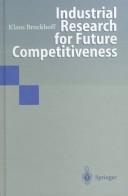
ISBN: 3540628428 3642645534 3642607896 Year: 1997 Publisher: Berlin Springer
Abstract | Keywords | Export | Availability | Bookmark
 Loading...
Loading...Choose an application
- Reference Manager
- EndNote
- RefWorks (Direct export to RefWorks)
Industrial research has come under pressure. Will recent budget cuts reduce competitiveness? Based on interviews in Japanese and European high-tech firms it is shown that research supports important potentials. These can be used for project funding, location decisions, and an analysis of sufficient conditions for research success. Careful management of the potentials should improve future competitiveness, and it should help to understand why industrial firms benefit from research and how.
Competition --- Research, Industrial --- Contract research --- Industrial research --- Research --- Engineering experiment stations --- Inventions --- Technological innovations --- Competition (Economics) --- Competitiveness (Economics) --- Economic competition --- Commerce --- Conglomerate corporations --- Covenants not to compete --- Industrial concentration --- Monopolies --- Open price system --- Supply and demand --- Trusts, Industrial --- Finance&delete& --- Management --- Economic aspects --- Business. --- Management science. --- Industrial engineering. --- Production engineering. --- Business and Management, general. --- Industrial and Production Engineering. --- Manufacturing engineering --- Process engineering --- Industrial engineering --- Mechanical engineering --- Management engineering --- Simplification in industry --- Engineering --- Value analysis (Cost control) --- Quantitative business analysis --- Problem solving --- Operations research --- Statistical decision --- Trade --- Economics --- Industrial management --- Finance --- Management.

ISBN: 0387948333 0387986138 9786610006816 1280006811 0387226338 1280188812 9786610188819 0387215697 Year: 1997 Publisher: Berlin Springer
Abstract | Keywords | Export | Availability | Bookmark
 Loading...
Loading...Choose an application
- Reference Manager
- EndNote
- RefWorks (Direct export to RefWorks)
Linear programming represents one of the major applications of mathematics to business, industry, and economics. It provides a methodology for optimizing an output given that is a linear function of a number of inputs. George Dantzig is widely regarded as the founder of the subject with his invention of the simplex algorithm in the 1940's. This second volume is intended to add to the theory of the items discussed in the first volume. It also includes additional advanced topics such as variants of the simplex method; interior point methods (early and current methods), GUB, decomposition, integer programming, and game theory. Graduate students in the fields of operations research, industrial engineering and applied mathematics will find this volume of particular interest.
Linear programming. --- Operational research. Game theory --- Optimization. --- Industrial and Production Engineering. --- Operation Research/Decision Theory. --- Mathematics. --- Operations research. --- Decision making. --- Mathematical optimization. --- Industrial engineering. --- Production engineering. --- Business. --- Matrix theory. --- Algebra. --- Business and Management. --- Linear and Multilinear Algebras, Matrix Theory. --- Operations Research/Decision Theory. --- Deciding --- Decision (Psychology) --- Decision analysis --- Decision processes --- Making decisions --- Management --- Management decisions --- Choice (Psychology) --- Problem solving --- Operational analysis --- Operational research --- Industrial engineering --- Management science --- Research --- System theory --- Manufacturing engineering --- Process engineering --- Mechanical engineering --- Management engineering --- Simplification in industry --- Engineering --- Value analysis (Cost control) --- Optimization (Mathematics) --- Optimization techniques --- Optimization theory --- Systems optimization --- Mathematical analysis --- Maxima and minima --- Operations research --- Simulation methods --- System analysis --- Decision making --- Mathematics
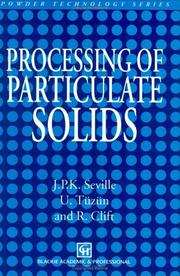
ISBN: 0751403768 9401071527 9400914598 9780751403763 Year: 1997 Publisher: London Blackie academic and professional
Abstract | Keywords | Export | Availability | Bookmark
 Loading...
Loading...Choose an application
- Reference Manager
- EndNote
- RefWorks (Direct export to RefWorks)
Over half of the products of the chemical and process industries are sold in a particulate form. The range of such products is vast: from agrochemicals to pigments, from detergents to foods, from plastics to pharmaceuticals. However, surveys of the performance of processes designed to produce particulate products have consistently shown inadequate design and poor reliability. `Particle technology' is a new subject facing new challenges. Chemical and process engineering is becoming less concerned with the design of plants to produce generic simple chemicals (which are often single phase fluids) and is now more concerned with speciality `effect' chemicals which may often be in particulate form. Chemical and process engineers are also being recruited in increasing numbers into areas outside their tranditional fields, such as the food industry, pharmaceuticals and the manufacture of a wide variety of consumer products. This book has been written to meet their needs. It provides comprehensive coverage of the technology of particulate solids, in a form which is both accessible and concise enough to be useful to engineering and science students in the final year of an undergraduate degree, and at Master's level. Although it was written with students of chemical engineering in mind, it will also be of use and interest to students of other disciplines. It comprises an account of the fundamentals of teh subject, illustrated by worked examples, and followed by a wide range of selected applications.
66-4 --- Particles. --- 62-492.2 --- 62-492.3 --- Size of particles --- Clay --- Colloids --- Sand --- Soils --- State, condition, form of materials etc. in chemical technology --- Pulverous material. Powders. Dusts --- Granular material. Grains. Granules. Shot. Grit --- Basic Sciences. Biotechnology --- Biotechnology (General) --- Biotechnology (General). --- 62-492.3 Granular material. Grains. Granules. Shot. Grit --- 62-492.2 Pulverous material. Powders. Dusts --- 66-4 State, condition, form of materials etc. in chemical technology --- Particles --- Industrial engineering. --- Production engineering. --- Materials science. --- Biotechnology. --- Engineering design. --- Industrial and Production Engineering. --- Characterization and Evaluation of Materials. --- Engineering Design. --- Design, Engineering --- Engineering --- Industrial design --- Strains and stresses --- Chemical engineering --- Genetic engineering --- Material science --- Physical sciences --- Manufacturing engineering --- Process engineering --- Industrial engineering --- Mechanical engineering --- Management engineering --- Simplification in industry --- Value analysis (Cost control) --- Design --- Grammar, Comparative and general Particles --- Grammar, Comparative and general --- Function words
| Listing 1 - 7 of 7 |
Sort by
|

 Search
Search Feedback
Feedback About UniCat
About UniCat  Help
Help News
News